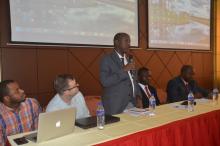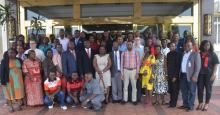Liberia Adopts Innovative Technology To Improve Timely Detection And Reporting of Suspected Acute Flaccid Paralysis Cases
Monrovia 20th March, 2017 - Liberia has strengthened its Acute Flaccid Paralysis (AFP) surveillance system a key strategy for polio eradication. This is reflected in several achievements registered including enhanced capacity of AFP surveillance at county, district and community levels countrywide, and community engagement and sensitization on AFP identification and reporting. The Ministry of Health (MoH) also adopted the Integrated Disease Surveillance and Response strategy to strengthen surveillance for all priority reportable diseases, conditions and events of public health importance including AFP.
These efforts have contributed to improved AFP Surveillance indicators namely Non-polio AFP rate and the percentage of stool specimen collected within 14 days of onset of paralysis. The Non-polio AFP rate before the Ebola Virus Disease (EVD) outbreak in 2012 was an average of 3 at national level, which fell to 1.5 during the EVD outbreak 2014/15. In 2016 the average Non-Polio AFP rate not only reached but surpassed the rates achieved before and during the EVD outbreak.
To further strengthen the AFP surveillance, the Ministry of Health in partnership with eHealth Africa, Novel-T and World Health Organization is piloting a mobile based surveillance tool for AFP in 4 districts in Montserrado County. This surveillance tool known as Auto-Visual AFP Detection and Reporting (AVADAR) is a mobile application which is installed on android-enabled mobile devices. Health Workers and Community Informants, are being trained to use this tool to improve timely detection and reporting of suspected AFP cases within health facilities and communities to trigger further investigations. This tool will also strengthen monitoring and accountability of the surveillance officers.
To kick start the process, a country level training on electronic Surveillance and integrated supportive supervision facilitated by a team of facilitators from WHO Africa Regional Office, IST and Nigeria, eHealth Africa, and Novel-T, commenced on 13th March 2017, at Golden Gate Hotel in Monrovia.
Hon Tolbert Nyenswah, the Director General of the National Public Health Institute of Liberia (NPHIL) in his remarks emphasized the importance of an effective surveillance system to foster real time decision making in a health system. He appreciated the support from WHO and partners, towards the progress registered in several aspects of the surveillance system in particular AFP surveillance, human resource capacity building, infrastructure development, and the establishment of the NPHIL in record time. The Director General said that the introduction of the electronic AFP surveillance tool will add extra value to the country’s capacity to further improve the surveillance system and pledged the institute’s support in scaling it up countrywide.
Dr Alex Gasasira, the WHO Representative for Liberia, congratulated the MOH and NPHIL for the tremendous progress made in implementing the different aspects of the Investment Plan to Build a Resilient Health System. He highlighted the improvement in preparedness, disease surveillance and response, and the attainment of the country’s highest AFP detection rate in 2016 in the last five years. Dr Gasasira thanked the Ministry of health and NPHIL for providing an enabling environment for partners to work together to support health.
Others who made remarks during the opening ceremony include representatives from eHealth Africa, and Novel T. Key partners supporting MOH in the implementation of Polio Eradication activities which will enable the country to remain polio free, include Bill and Melinda Gates Foundation, US Centers for Disease Control and Prevention (CDC), Rotary International, Gavi Alliance, United Nations Children Fund (UNICEF), the World Health Organization (WHO) and national and international NGOs.
_________________________________________________
For more information contact:
Technical: Dr Wambai Zakari, +2318806631473 wambaiz [at] who.int" target="_blank"> wambaiz [at] who.int
Dr Emeka Agbo agboc [at] who.int" target="_blank"> agboc [at] who.int
Communication: Luwaga Liliane +231880034450 luwagal [at] who.int" target="_blank"> luwagal [at] who.int


